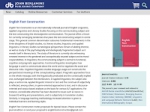
NEWS: Chatbots.org survey on 3000 US and UK consumers shows it is time for chatbot integration in customer service!read more..
English Text Construction
Summary: English Text Construction focuses on the communicating subject and the text constructing of this communication.

English Text Construction is an internationally refereed journal of English Linguistics, Applied Linguistics and Literary Studies focusing on the communicating subject and the text constructing this intersubjective communication. The journal offers a forum for currently converging tendencies that place the text-constructing subject in centre stage. This general common denominator subsumes fundamental movements in the three disciplines of English studies, viz. literary studies, linguistics and applied linguistics. In literary studies narratological perspectives remain of abiding interest, as well as study of the psychologically and ideologically fragmented subject as it reveals itself in literary texts. The study of literature is currently also witnessing renewed interest in the gendered and sociopolitically situated subject and its moral responsibilities. In linguistics, the communicating subject is central to functional, cognitive and pragmatic approaches. Functional linguistics investigates how language is used to communicate about the world and to negotiate the social and discourse roles. Cognitive linguistics studies language usage as it constructs the perspectivized meanings of the conceptualizing subject. Pragmatic approaches focus on the whole message, both the linguistically predicated and the contextually implied one, exchanged between the interlocutors. In Applied linguistics, the subject also plays a central role. Applied linguistic interest in text and the construal of subjectivity is reflected, among others, in genre-oriented approaches to text, and in discourse-oriented and corpus-based analyses as the basis for various ELT applications. For instance, considerable attention has been devoted to issues such as stance in (research) writing and presentations, and to subjectivity in translation studies. Similarly, in language teaching methodology increased attention is given to individual learners and learning styles.
New Comment
Only registered members are allowed to comment. or login
or login
